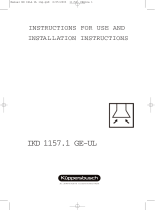
Dear client
Congratulations on your choice. We are sure that this
modern, functional and practical appliance, made with top
quality materials, will fully satisfy your needs.
Please read every section of this INSTRUCTIONS
MANUAL before using your kitchen hood for the first time,
toensuremaximumperformancefromtheapplianceand
to avoid breakdowns, which may be caused by incorrect
use, as well as to allow any minor problems to be solved.
Toobtainoptimumperformance,theexternalconductmust
not be more than FOUR METRES long, have no more than
two 90° angles and its diameter must be at least Ø120.
• Please be aware of current local regulations with
reference to domestic electrical fittings and gas
eduction.
• Verify that the tension and frequency of the network
match those indicated on the label located inside the
kitchen hood.
• Ifthesupplycableisdamageditshouldbereplacedby
the manufacturer, the after-sales service or a suitably
qualified person in order to avoid hazard.qualified
person in order to avoid hazard.
• Incaseyourcooker hood is not provided withaplug
for the mains connection or is not accessible in normal
conditions it is necessary to install a disconnection
switch to the house installation, according to the local
standards for installations.
• Make sure a good ground connection (this does not
apply to class II appliances, indicated accordingly on
the rate plate with )
• Oncethekitchenhoodhasbeeninstalled,ensurethat
the mains cable to the network is not in contact with
sharp metal edges.
• Thefumesshouldnotbeextractedthroughpipesthat
areusedtoevacuatethefumesofgas(oranotherfuel)
operated devices.
• Iftheextractorfanisgoingtobeusedsimultaneously
with equipment powered by a non-electric energy
source, e.g.: gas cookers, then the room must have
sufficient ventilation.
• Excessive fat accumulation in the kitchen hood and
metal filters is a fire risk and may also cause dripping,
therefore the inside of the kitchen hood and the metal
filters must be cleaned at least once a month.
• Thelowerpartofthekitchenhoodmustbefitted
at least 65cm over gas or mixed hobs. FOLLOW
THE HOBS´ MANUFACTURER’S MINIMUM
RECOMMENDATIONS. This distance can be reduced
if this is indicated by the manufacturer in the cooker
hood instruction manual.
• Neverleavegashobslitifnotcoveredbyacontainer.
The fat accumulated in the filters may drip or catch fire
when the temperature increases.
• Avoidcookingunderthekitchenhoodifthemetalfilters
are not fitted, e.g.: while they are being cleaned in the
dishwasher.
• Youmustnotproduceflamesunderthekitchenhood.
• Disconnect the appliance before any interior
manipulation, e.g. during cleaning or maintenance.
• Werecommendtheuseofglovesandtobeextremely
careful when cleaning the kitchen hood’s interior.
• Your kitchen hood is designed for domestic use and
onlyforextractionandpurificationoffumesproduced
during food preparation. It will be your responsibility if
it is used for other purposes, which may be dangerous.
The manufacturer cannot accept responsibility for
damage caused by improper use of the appliance.
• Forrepairsplease contactthemanufacturer’snearest
Technical Assistance Service, and always use genuine
spare parts. Repairs or modifications carried out by
unqualified personnel can cause malfunctions or may
damage the appliance, putting your safety in danger.
• This appliance is marked according to the European
directive 2002/96/EC on “Waste Electrical and
Electronic Equipment” (WEEE). This guideline is the
frame of a European-wide validity of return and
recycling on Waste Electrical and Electronic Equipment,
.
• Thisdeviceisnotmeanttobeusedbypersons(including
children) whose physical, sensory or mental capacities
are reduced, or who lack experience/ knowledge,
exceptiftheyhavesupervisionorreceivedinstructions
forusingthedevicebythepersonresponsibleforhis/
her safety. Keep children away from the device and
never let them play with it.
Instructions for use
You can activate or deactivate the cooker hood by
operating the functions shown in the diagram.
Switchontheextractorfanafewminutesbeforeyoustart
to cook in order to ensure that a steady air flow has been
established before fumes appear.
Allow the extractor fanto run for several minutes after
you have finishedcooking (between 3to 5 minutes)in
order to expelall the grease from theoutlet duct. This
prevents the return of grease, smoke and smells.
Safety Instructions
GB


